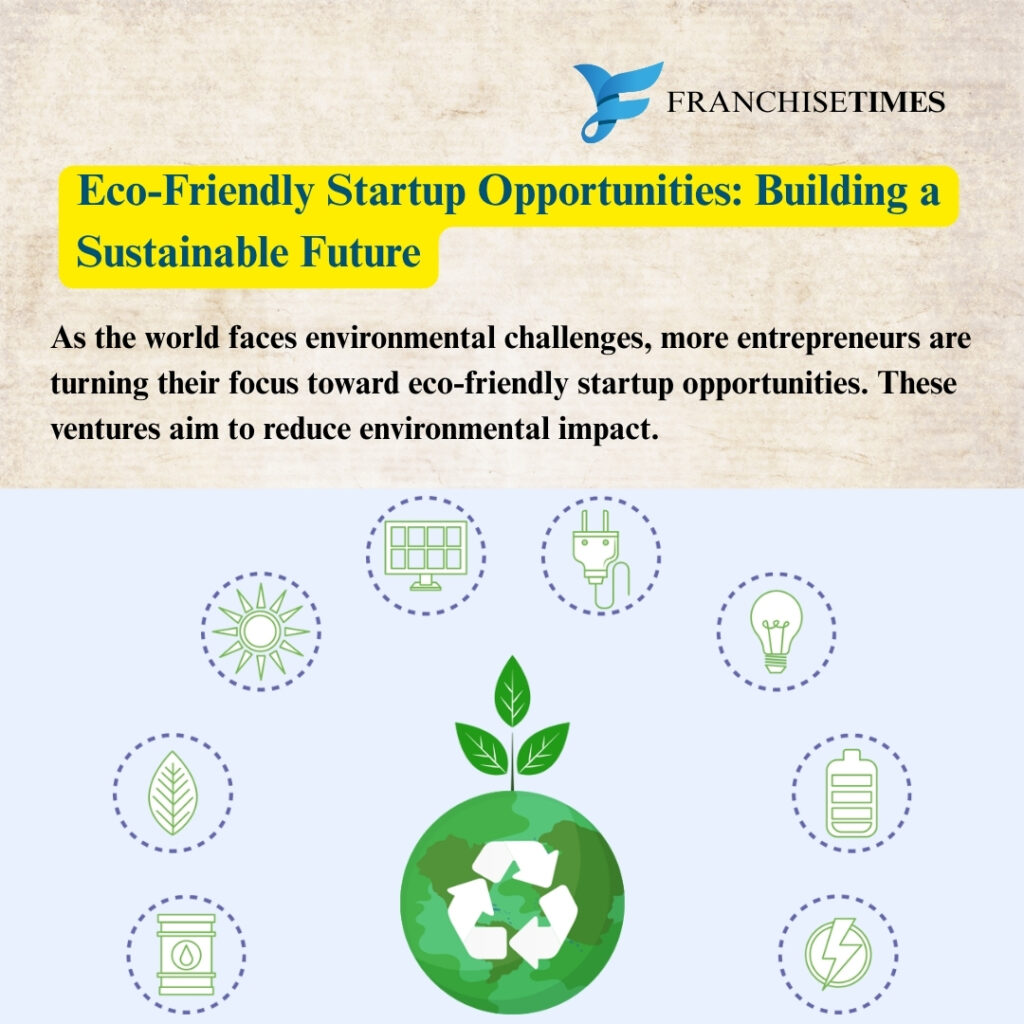Eco-Friendly Startup Opportunities: Building a Sustainable Future
As the world faces mounting environmental challenges, more entrepreneurs are turning their focus toward Eco-Friendly Startup Business Opportunities. These ventures aim to reduce environmental impact while offering innovative solutions to global problems. With climate change, pollution, and waste management at the forefront of global discussions, the demand for green businesses is steadily increasing. This presents a golden opportunity for startups to align profitability with sustainability.

1. The Rise of Eco-Friendly Startups
In recent years, the number of Eco-Friendly Startup Business Opportunities has surged. More consumers are becoming environmentally conscious, pushing companies to adopt sustainable practices. This shift has opened the door for innovative startups that prioritize planet-friendly alternatives. Whether it’s through biodegradable packaging, renewable energy solutions, or sustainable agriculture, these startups are making a significant impact.
One of the key drivers of this movement is the growing availability of green technology. With advancements in solar panels, energy-efficient appliances, and carbon capture methods, launching an eco-friendly business has become more feasible than ever. Governments and investors are also encouraging the shift by offering incentives, grants, and funding to green startups.
2. Top Eco-Friendly Startup Ideas
There are numerous eco-friendly startup opportunities that aspiring entrepreneurs can explore. Each offers the potential to make a positive environmental impact while building a profitable business.
a. Sustainable Packaging Solutions
Plastic waste is one of the biggest environmental threats today. A startup that offers biodegradable or reusable packaging can significantly reduce pollution. Materials like cornstarch, mushroom roots, and seaweed are being used to create innovative packaging solutions.
b. Renewable Energy Installations
With the cost of solar and wind energy dropping, there’s a growing market for renewable energy startups. Companies that install solar panels or provide clean energy consulting services are seeing high demand.
c. Eco-Friendly Fashion
The fashion industry is notorious for its carbon footprint. Startups offering sustainable clothing made from organic cotton, recycled materials, or upcycled garments are gaining popularity. Eco-conscious consumers are willing to pay a premium for ethical fashion.
d. Green Construction Materials
The construction industry consumes a massive amount of resources. Startups that provide sustainable building materials, such as bamboo, recycled steel, or hempcrete, can help reduce the environmental impact of new developments.
e. Organic Farming and AgriTech
Startups focusing on organic farming and sustainable agriculture techniques are essential for food security. Innovations such as vertical farming, hydroponics, and precision agriculture are revolutionizing the farming sector.
3. How to Start an Eco-Friendly Business
Turning your passion for the environment into a viable business requires careful planning and execution. Here’s a step-by-step guide to get started:
Research and Validate Your Idea:
Begin by conducting market research. Understand the pain points of your target audience and identify how your eco-friendly solution can address them. Validation is crucial to ensure your idea has demand.
Develop a Sustainable Business Model:
Your startup should not only be eco-friendly but also financially sustainable. Consider cost-effective sourcing, energy-efficient operations, and minimal waste production in your model.
Secure Funding:
Many investors are actively seeking green startups to support. Additionally, government programs and environmental organizations offer grants and subsidies to sustainable businesses. Be sure to explore these funding options.
Build a Green Brand Identity:
Transparency and authenticity are key. Highlight your eco-friendly practices, certifications, and impact metrics in your branding. Use recyclable materials in packaging and promote sustainable values in your marketing.
Measure and Improve:
Continuously track your environmental impact and seek ways to improve. Whether it’s reducing energy consumption or sourcing more ethical materials, small improvements add up over time.
4. Benefits of Launching an Eco-Friendly Startup
Starting a green business isn’t just good for the planet—it also makes sound business sense. Here are several advantages:
Growing Consumer Demand:
Consumers are increasingly making purchasing decisions based on sustainability. Eco-conscious buyers are loyal and often become brand advocates.
Investor Interest:
Venture capital firms and angel investors are more inclined to support businesses with a social or environmental mission. This makes it easier to secure funding.
Brand Differentiation:
Sustainable startups stand out in competitive markets. Eco-friendly values enhance your brand story and help attract like-minded partners and customers.
Regulatory Support:
Governments across the globe are implementing policies that favor green businesses. Tax incentives, grants, and certifications can provide a significant boost.
Positive Impact:
Perhaps the most fulfilling benefit is knowing that your business is making a difference. You contribute to a cleaner, healthier planet while inspiring others to do the same.
5. Challenges and How to Overcome Them
Despite the promising landscape, eco-friendly startups face several challenges. However, with strategic planning, these hurdles can be overcome.
High Initial Costs:
Green materials and technologies can be expensive initially. Start by targeting niche markets willing to pay a premium and scale gradually as costs decrease.
Supply Chain Complexity:
Sourcing sustainable materials can be difficult. Partner with trusted suppliers and consider local sourcing to reduce your carbon footprint.
Consumer Skepticism:
Some consumers doubt the authenticity of green claims. Be transparent and back your practices with certifications and third-party audits.
Regulatory Barriers:
Navigating environmental regulations can be challenging. Work with legal experts and stay updated with changing laws to remain compliant.
Scalability:
Sustainable practices may not always scale easily. Focus on building scalable models from the start and invest in technology to aid growth.
The Role of Innovation and Collaboration
To truly thrive in the eco-friendly startup space, innovation and collaboration are key. Startups that invest in research and development often discover new ways to minimize waste, reduce emissions, or optimize resource usage. Collaborating with like-minded organizations, research institutions, and environmental NGOs can amplify your impact and accelerate growth. By joining forces, green startups can share resources, co-develop solutions, and influence policy changes more effectively. Innovation doesn’t have to happen in isolation—working together makes the path to sustainability more achievable and rewarding.
Conclusion
Eco-Friendly Startup Business Opportunities offer an exciting pathway for entrepreneurs who want to create change. By focusing on sustainability, innovation, and responsible business practices, you can build a venture that not only thrives financially but also contributes to a better future. The time to act is now. As global awareness of environmental issues continues to grow, so does the potential for green startups to lead the way.
With strategic planning, a clear mission, and a commitment to impact, your eco-friendly startup can become part of the solution—helping to build a sustainable future for generations to come.
